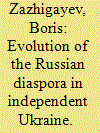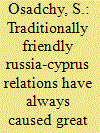| Srl | Item |
| 1 |
ID:
073618


|
|
|
|
|
| Publication |
2006.
|
| Summary/Abstract |
In a situation where ethnic Russians are now the lowest caste on the social ladder of Ukrainian society, they are not in the position to uphold their rights in Ukraine on their own. Today, the outlook for the Russian diaspora's involvement in Ukrainian politics is bleak.
|
|
|
|
|
|
|
|
|
|
|
|
|
|
|
|
| 2 |
ID:
098134


|
|
|
|
|
| Publication |
2010.
|
| Summary/Abstract |
The article describes the history of the Russian diaspora in Japan from 1858 to our days. The island of Hokkaido was the most attractive place for Russians thanks to its geographic position. There were Russian communities also in Nagasaki, Kobe, Tokyo and Yokohama. The article dwells on the main spheres of business and public activities of Russians in Japan.
|
|
|
|
|
|
|
|
|
|
|
|
|
|
|
|
| 3 |
ID:
104049


|
|
|
|
|
| Publication |
2011.
|
| Summary/Abstract |
Russia's attitudes toward millions of Russophones in the Newly Independent states (NIS) have been noted, since 1991, for their ambivalence. The concept of a "Russian diaspora" has been pursued as an ethno-selective ideological project. On the practical-political level, however, Russian authorities were obliged to rest upon a loose notion of "compatriots." In this article, "virtual diasporization" is juxtaposed with Russophones' identities and behavior to substantiate the point that these populations do not possess the "diasporic" features ascribed to them. Moreover, official Russian policies have failed to evoke any "diasporic" sentiment within Russophones toward their putative "homeland." I argue that, to be more realistic and responsive, these policies should be more sensitive to commonalities and zones of common interest between Russophones and the titular populations of the NIS.
|
|
|
|
|
|
|
|
|
|
|
|
|
|
|
|
| 4 |
ID:
112876


|
|
|
|
|
| Publication |
2012.
|
| Summary/Abstract |
The article examines the harnessing of the contemporary Russian diaspora in certain domains of Russia's international relations. It looks specifically at Russian officialdom's ambivalent efforts at developing and engaging with a global network of state-backed diaspora associations, especially as instruments of cultural outreach. The focus is on the relatively recent implementation of this strategy in the West. The first half of the article discusses the ideological ambiguities of this project in general terms; the second examines how it plays itself out in practice, on the example of the United Kingdom. The article suggests that analysing the ambiguities established in the relationship between state and diasporic structures in this context is vital to understanding the current role of the Russian state in the politics of Russian diasporisation.
|
|
|
|
|
|
|
|
|
|
|
|
|
|
|
|
| 5 |
ID:
188507


|
|
|
|
|
| Summary/Abstract |
Alexander Gasyuk, Rossiyskaya gazeta correspondent in Cyprus: Russia-Cyprus relations have traditionally been friendly and always been marked by a high level of mutual trust. What is the current state of relations between our countries in the context of today's international challenges, considering that Nicosia has joined the unprecedented EU sanctions against Russia?
|
|
|
|
|
|
|
|
|
|
|
|
|
|
|
|